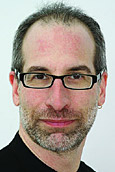Lawrence University psychologist Peter Glick will be one of a select group of scholars to deliver a talk at the Harvard Business School symposium “Gender and Work: Challenging Conventional Wisdom” Feb. 28-March 1 in Boston.

A social psychologist whose scholarship focuses on both the subtle and the overt ways in which prejudices and stereotypes foster social inequality, Glick will deliver the address “BS at Work: How Benevolent Sexism Undermines Women and Justifies Backlash” at the symposium, which will examine cutting-edge research and ideas about gender in organizations.
Glick and his research partner, Susan T. Fiske of Princeton University, Glick introduced the concept of “ambivalent sexism,” which asserts that not just hostile, but patronizing views undermine and sabotage women at work. Benevolent sexism, which asserts women are wonderful but fragile and require men’s protection and assistance, limits women’s opportunities, leads to “soft” and uninformative feedback, undermines women’s performance and justifies backlash toward women who fail to live up to feminine ideals.
Glick is the only presenter from a liberal arts college at the symposium, which features scholars from Harvard Business School, Northwestern University, MIT and Stanford University, among others.
A member of the Lawrence faculty since 1985, Glick earned his bachelor’s degree in psychology from Oberlin College and his Ph.D. in social psychology from the University of Minnesota. He’s been recognized with the 1995 Gordon W. Allport Prize for his research on ambivalent sexism and Lawrence’s 2011 Award for Excellence in Scholarship.
About Lawrence University
Founded in 1847, Lawrence University uniquely integrates a college of liberal arts and sciences with a nationally recognized conservatory of music, both devoted exclusively to undergraduate education. It was selected for inclusion in the Fiske Guide to Colleges 2013 and the book “Colleges That Change Lives: 40 Schools That Will Change the Way You Think About College.” Individualized learning, the development of multiple interests and community engagement are central to the Lawrence experience. Lawrence draws its 1,500 students from nearly every state and more than 50 countries. Follow Lawrence on Facebook.




